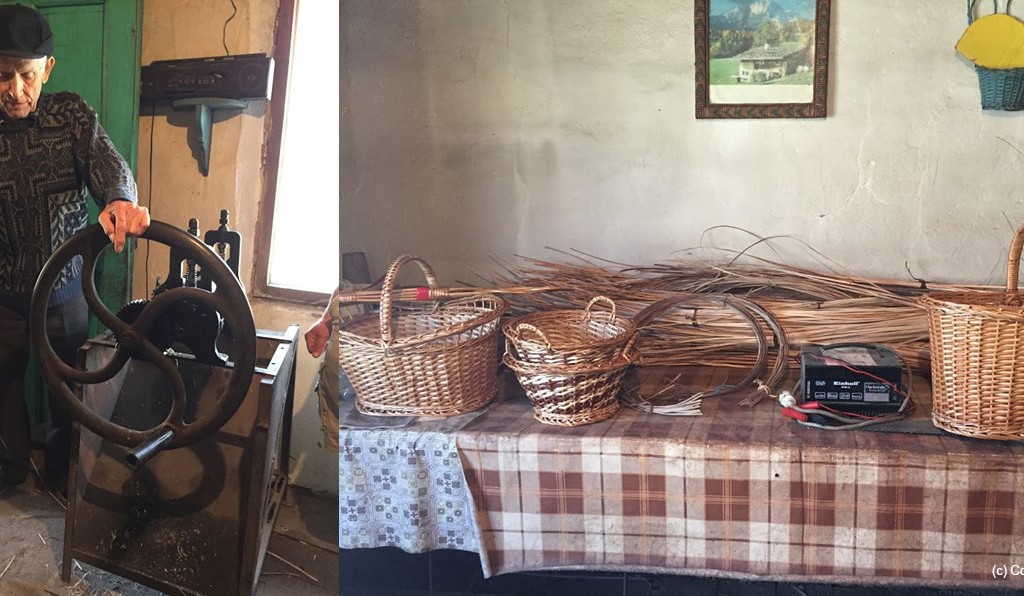LENA - Almost forgotten crafts in Ciocăneşti, rediscovered on two wheels
17-04-2018
The beginning of April found us on the Danubian lands, where we are setting up cyclo trails along the natural riches of the Natura 2000 Ciocănești-Dunăre site. And as natural riches are closely linked to people living in the area, we stopped by to meet those who struggle with the challenges of preserving and perpetuating the cultural patrimony in the area.

We discovered the authentic meadow areas, the fields just waiting to turn green and show us the generous floral palette of the plain and wetlands alike. All this on two wheels, preparing on one hand the cyclo trails, about which we will tell you over the next few months, and on the other testing the new electric bikes that will soon be available for rent. We hope to develop a network of trails which will bring visitors closer to the natural and cultural richness that the Ciocănești-Danube area can offer.
On our path we did not forget to pay attention to the locals as well, who witnessed both the good and the bad times of the Ciocănești area. "The people of this place, with souls of the most beautiful and working hands, are among the few left who know crafts. From their hands braided baskets emerge, chairs like those our grandparents used for sitting down at the table; from their hands horseshoes, barrels or boats are created." Our colleague, Corina Gheorghiu, tells us, the one who explored the area alongside our friends from Outhentic Cycling Romania. "You can spend hours looking at how those hands, extensions of the tools they use day by day, give new life to the materials they touch. You cannot help but admire the skill acquired through decades of patience and perseverance; you cannot help but admire the italic movements. These people know their job like we all know to breathe!"

Thus, we met Nea (mister) Vergica, a wood crafter in the village of Mănăstirea, “whom I found standing on a pile of woodchips, surrounded by several chairs that were prepared for the Sunday fair, the only place where he can still sell his beautifully carved chairs, a place that reminds us of the holidays spent at our grandparents’. None of his children took on the craft, no one in the village is interested in perpetuating it.”
“The same is the situation of Marin Tom, also called mister Rusu. He is far too old to weave in winter. The cold gets in his bones and they hurt him. Weaving is not an easy task. Wicker sticks must be prepared, cleaned, cut, soaked, split, thinned so that they can be crafted with skill. Mister Rusu is waiting for good weather to start, he does not think of giving up the craft.”

But what happens with the old trades of the meadow areas?
“You would probably think that, in a village near the Danube, fixing boats is a safe job. Not for mister Fiță. The fishermen slowly started disappearing from the village. After the embankment of the Danube in the drained areas, an increasingly unprofitable type of agriculture was practiced. Even so, the incomes did not go into the villagers' homes. Despite this, mister Fiță is cheerful; he smiles warmly and thanks God for the life he is living. He does not repair boats anymore, but, being a carpenter, he always finds something to repair around the house.”
Thus, although we apparently believe that there is no interdependence between people and nature and we live under the impression that what is happening in a part of the world does not have an impact on us, here is the reality that strikes us. Life as we remember it and as we love it depends on the welfare of our natural and, ultimately, cultural heritage. It is important not to forget, and to invest in the welfare of nature and the places that bring us fulfillment, peace and tranquility. There will be a busy and beautiful time in the Ciocănești pilot area, and we will be there to bring you news about all the things we want to "craft" with the beautiful people in our pilot area.
If you want to read Corina’s entire story, about what she felt like being in the Călărași lands, you can find her whole article here.
To stay up to date please like and follow our Facebook page: https://www.facebook.com/lenadanube/
